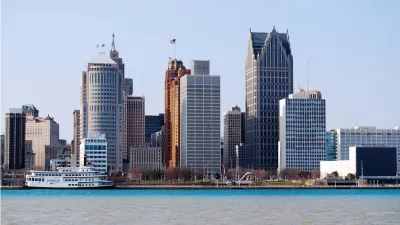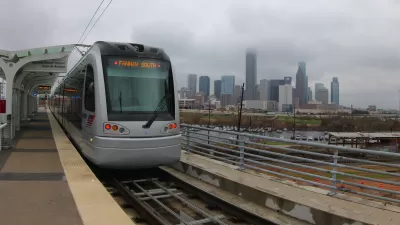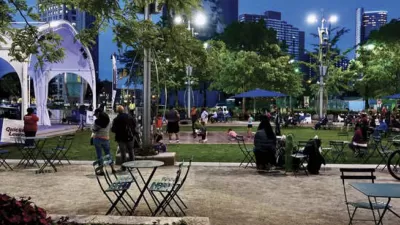Now is the time for cities to make strategic investments to scale up existing revitalization efforts.

"For 'legacy cities,' decades of economic decline have generally meant an array of ambitious revitalization plans are queued up but languishing, due to lack of funding and/or political will." Now, write Lavea Brachman and Eli Byerly-Duke, these cities have a chance to reinvigorate stagnant projects through federal funding from the American Rescue Plan (ARP). "Now is the moment for these cities to dust off their wish lists, activate their strategic playbooks to maximize the ARP funds, and line up implementation partners."
It has become clear that "the private sector alone cannot rescue these legacy places," but "the prospect of extensive public sector funds deployed alongside private sector investments and acting as a springboard for legacy cities and their regions is tantalizing." In cities that were already experiencing redevelopment before the COVID-19 pandemic, "local leaders can build on existing projects and initiatives" to regain momentum.
Meanwhile, "the opportunity to address equity issues in these cities and regions has never been greater." Targeted investments in low-income areas "can reinforce place-based initiatives already underway, such as East Side Avenues in Buffalo and the Strategic Neighborhood Fund in Detroit, catalyzed with state and local public investments and scaled with philanthropic funding." The authors highlight other examples of successful programs and projects in legacy cities that have made a positive impact and could be scaled up with increased funding and resources. "With the pie suddenly dramatically expanded, leaders can build on these pre-COVID projects by coalescing around priority-setting and sequencing of dollars deployed."
FULL STORY: Legacy cities can think big for transformative impact with ARP funds

Planetizen Federal Action Tracker
A weekly monitor of how Trump’s orders and actions are impacting planners and planning in America.

Restaurant Patios Were a Pandemic Win — Why Were They so Hard to Keep?
Social distancing requirements and changes in travel patterns prompted cities to pilot new uses for street and sidewalk space. Then it got complicated.

Maui's Vacation Rental Debate Turns Ugly
Verbal attacks, misinformation campaigns and fistfights plague a high-stakes debate to convert thousands of vacation rentals into long-term housing.

In California Battle of Housing vs. Environment, Housing Just Won
A new state law significantly limits the power of CEQA, an environmental review law that served as a powerful tool for blocking new development.

Boulder Eliminates Parking Minimums Citywide
Officials estimate the cost of building a single underground parking space at up to $100,000.

Orange County, Florida Adopts Largest US “Sprawl Repair” Code
The ‘Orange Code’ seeks to rectify decades of sprawl-inducing, car-oriented development.
Urban Design for Planners 1: Software Tools
This six-course series explores essential urban design concepts using open source software and equips planners with the tools they need to participate fully in the urban design process.
Planning for Universal Design
Learn the tools for implementing Universal Design in planning regulations.
Heyer Gruel & Associates PA
JM Goldson LLC
Custer County Colorado
City of Camden Redevelopment Agency
City of Astoria
Transportation Research & Education Center (TREC) at Portland State University
Camden Redevelopment Agency
City of Claremont
Municipality of Princeton (NJ)





























